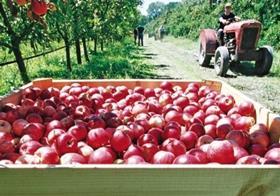
The release of the New Zealand topfruit industry's findings into the greenhouse gas emissions (GHG) created by producing, packing, transporting selling, consuming and disposing of exported apples has drawn praise from a leading government figure.
Findings in the report showed that 1kg of braeburn or royal gala apples sent to Europe generated nearly their own weight in greenhouse gases, with over half of the global warming potential coming from the shipping used to transport the fruit to the continent.
Apples in the orchard, at the packhouse and at ports contributed between 15 per cent and 19 per cent to overall carbon emissions, the report said.
Agriculture minister David Carter told the Pipfruit New Zealand conference in Napier that he was backing the study, and encouraged the industry to use the research to 'make a difference in the marketplace'.
'This work makes great business sense. It is a significant contribution to New Zealand's leading reputation in GHG research,' he said. 'It enables the industry to identify both a point against which to measure future reductions, and key targets to reduce GHG emissions and costs along the apple supply chain.'
Mr Carter added that the research was crucial as overseas consumers become more discerning, position New Zealand products in the carbon-conscious category.
'By identifying where efficiencies can be achieved, the pipfruit industry can continue to enhance the premium product that is the New Zealand apple,' he said. 'The approach developed through this study can help demonstrate how New Zealand producers are world leaders in fruit.'
Peter Beaven, CEO of Pipfruit NZ – which helped collaborate the report alongside the country's ministry of agriculture and forestry – told local media that there was 'considerable potential' for reducing emissions from shipping, including better use of ship capacity, slower shipping speeds, improved efficiency of refrigeration and new ship designs.



